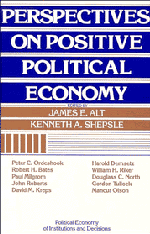Book contents
- Frontmatter
- Contents
- List of contributors
- Series editors' preface
- Acknowledgments
- Editors' introduction
- PART I THE NEW POLITICAL ECONOMY
- 1 The emerging discipline of political economy
- 2 Macropolitical economy in the field of development
- PART II ORGANIZATIONS, TRANSACTIONS, AND OPPORTUNITIES
- PART III REFLECTIONS ON THEORETICAL FOUNDATIONS
- Notes
- References
- Index
2 - Macropolitical economy in the field of development
Published online by Cambridge University Press: 05 July 2011
- Frontmatter
- Contents
- List of contributors
- Series editors' preface
- Acknowledgments
- Editors' introduction
- PART I THE NEW POLITICAL ECONOMY
- 1 The emerging discipline of political economy
- 2 Macropolitical economy in the field of development
- PART II ORGANIZATIONS, TRANSACTIONS, AND OPPORTUNITIES
- PART III REFLECTIONS ON THEORETICAL FOUNDATIONS
- Notes
- References
- Index
Summary
The study of developing societies as a distinct field of contemporary political science began in the 1950s. Cambridge, Mass., provided the birthplace for important traditions in the field, whose content was shaped by the intellectual interests of the scholars who were its parents. Early researchers focused on the modernization of traditional societies and in particular on the political significance of mass communications and of human culture.
As did so many of my generation, I made my way to Cambridge to train with the pioneers of development studies. In my early work, I essentially adopted their definition of the field. But later I changed. The seeds of doubt had been planted early on, and they propelled me toward a perspective based on political economy.
INTERESTS AND OPTIMIZING BEHAVIOR
My dissertation focused on the roles of the Mineworkers' Union and of the United National Independence Party in implementing the government's labor policy in postindependence Zambia. Adopting the social-psychological approach that had dominated my graduate training, I attempted to explain that policy's failure in terms of the inability of the union and the governing party to communicate the foundations for the government's labor policy effectively. That policy consisted of a wide national perspective, specific development objectives, and the appropriation of an investable surplus from the mining industry. The fact that the union and political party provided poor communication between the government and the labor force, I argued, helped to explain the continued militancy of the laborers.
- Type
- Chapter
- Information
- Perspectives on Positive Political Economy , pp. 31 - 54Publisher: Cambridge University PressPrint publication year: 1990
- 13
- Cited by

